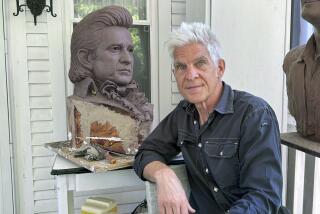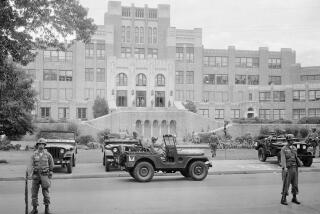In Arkansas, Welcome Mats and Brickbats
- Share via
LITTLE ROCK, Ark. — President Clinton, at risk of disbarment in his home state, basked in the warmth of the Arkansas legal establishment Thursday as he delivered a speech at the University of Arkansas Law School.
Some of Clinton’s toughest critics are in Arkansas--and he is facing disbarment proceedings in the state for giving false testimony in the Paula Corbin Jones sexual harassment case.
But it is to this state that he always turns for spiritual replenishment. And Thursday there was plenty of that--not only in a ceremony the president attended to rename the law school but at an earlier tribute to Daisy Bates, a beloved figure in the Little Rock civil rights community for half a century.
At the law school, Clinton relaxed before an audience of practicing lawyers, law professors and politicians--some who had been all three. He leaned back in his chair, patted old friends on the back and laughed at others’ self-deprecating humor, all under warm spring skies on a lawn at the edge of Little Rock’s MacArthur Park.
And he swapped memories with William H. Bowen, whose name will now grace the law school. Bowen was Clinton’s chief of staff during his last two years as governor of Arkansas and served in the mid-1990s as dean of the University of Arkansas Law School.
A banker as well as lawyer and public figure, Bowen reminded the former governor of a motto that had adorned Clinton’s office wall: “It never hurt a good man to take a few lickins.”
Bowen has a special place in Clinton’s personal political history. He took over as chief of staff in 1991 as the governor was beginning his presidential campaign.
“If it hadn’t been for you,” Clinton told Bowen, “I couldn’t have done it. I hope you’re proud of what has happened in America in the past eight years, because your selfless decision to be a public servant made it all possible.”
For all the warmth of the ceremony, Clinton’s future among the legal establishment here may not be sunny. He avoided impeachment in the wake of the Jones and Monica S. Lewinsky matters and his law license was renewed Feb. 29 for a $100 fee.
But a federal judge and the Southeastern Legal Foundation in Atlanta have filed complaints against him, and the matter has been referred to the state Supreme Court Committee on Professional Conduct.
He asked in March that consideration of disbarment, or suspension, be postponed until he leaves office, but the request was denied. However, it is not clear when the Supreme Court committee will act.
At the heart of the issue are statements Clinton gave under oath Jan. 17, 1998, in which he said that he had never had a sexual relationship with Lewinsky.
U.S. District Judge Susan Webber Wright, who was present when Clinton testified, subsequently ruled that he was in civil contempt of court. She filed a complaint with the committee asking it to consider action against Clinton.
Earlier in the day, Clinton attended a memorial service for Bates, a mentor to the nine black students who integrated Central High School here in 1957 with the backing of Army troops sent by President Eisenhower.
Bates died in November at the age of 84, and on Thursday Clinton announced the start of a process intended to designate her home as a national historic landmark. He used the occasion to reiterate what has become a central theme in the closing months of his presidency.
If he were to learn, he said, that his term--and his life--were ending today and he would be granted one wish, “I would wish that we find it in our hearts to be one America.”
Bates was president of the Arkansas chapter of the National Assn. for the Advancement of Colored People. She and her husband published the Arkansas State Press, known for its crusading coverage of civil rights issues.
The students who broke the color barrier at the high school met at the Bates home on the morning that they sought to enter the high school.
They were escorted to the school by Little Rock police but were hustled out several hours later when a hostile mob broke through a barricade. Eisenhower then called in the 101st Airborne to ensure that the black children got to school safely. Each morning, as the school year got underway, the group met at the Bates home before classes.
More to Read
Sign up for Essential California
The most important California stories and recommendations in your inbox every morning.
You may occasionally receive promotional content from the Los Angeles Times.










